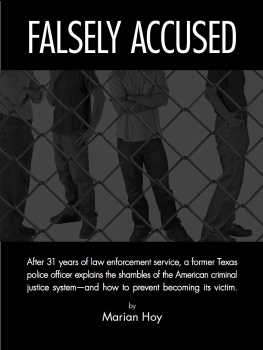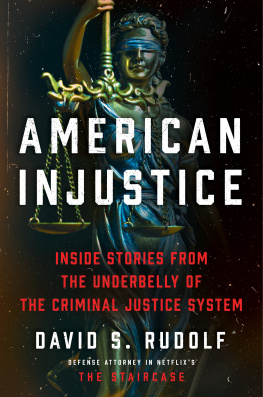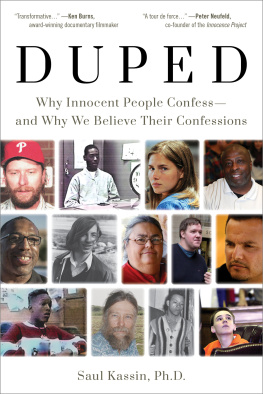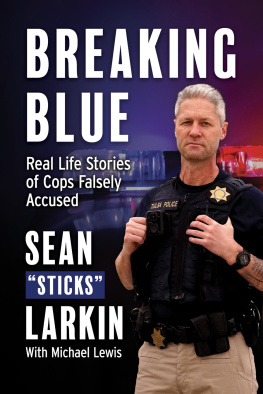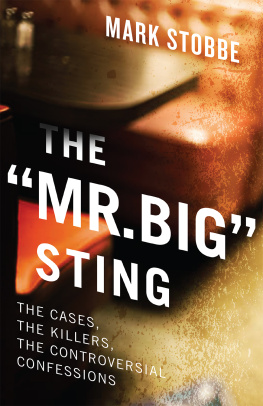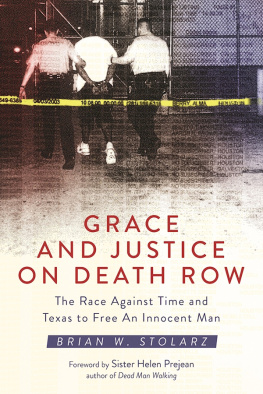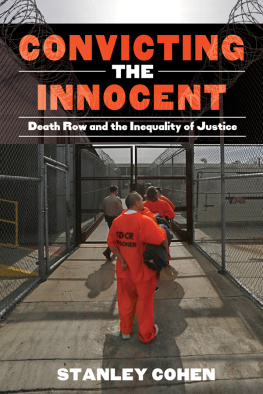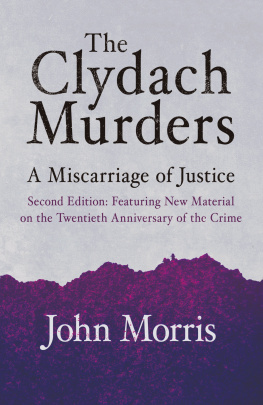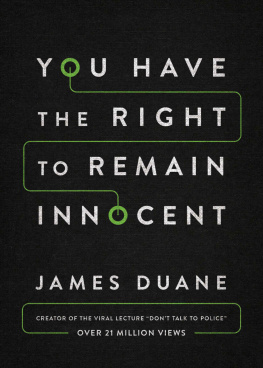Falsely Accused
After 31 years of law enforcement service, a former Texas police officer explains the shambles of the American criminal justice systemand how to prevent becoming its victim.
Marian Hoy
Copyright 2011 by Marian Hoy
Publish Green
212 3rd Ave North, Suite 290
Minneapolis, MN 55401
612.455.2293
All rights reserved. No part of this publication may be reproduced, stored in a retrieval system, or transmitted, in any form or by any means, electronic, mechanical, photocopying, recording, or otherwise, without the written prior permission of the author.
ISBN: 978-1-938297-75-5
Preface
This book is an overview of erroneous and intentional behaviors deliberately committed by what I refer to as the police culture which is the sum of peace officers, prosecutors, courts, and prisons. I specifically address those peace officers (throughout the book peace officer, and/or officer, will include any sworn police officer, deputy, or officer of the court) and prosecutors who knowingly and willingly arrest and prosecute innocent persons for crimes they did not commit. In light of that statement I want to say there are many, many peace officers and prosecutors who would never consider implicating an innocent person, and I salute and admire those individuals for correctly enforcing the laws of our country.
Sadly, there are enough peace officers and prosecutors who do routinely falsely accuse innocent persons, so that Innocence Projects, designed to free innocent people from jail, have popped up in most states throughout the country.
Chapter 1
What we should fear about police officers and prosecutors
After working for 31 years as a peace officer, and trainer of peace officers in the State of Texas, I want you to know many of them scare me to death, and they should you too!
Thats not an easy statement for me to say because for years I was proud to be a member of the police culture. There are still a great number of honest peace officers who would never abuse or violate the rights of citizen, but there are enough dishonest peace officers that we all need to be fearful.
As a peace officer who worked patrol duties, I frequently arrested persons, and presented evidence on those arrests to the prosecutors office in my jurisdiction. I testified in court, and because of my truthful testimony persons were incarcerated for crimes they committed.
After retiring from law enforcement, I listened with great interest to the stirrings in the news about innocent persons imprisoned for crimes they did not commit. As I dug deeper into a steady stream of cases of those persons exonerated (person is found innocent of criminal charges and released from prison) just to see what went wrong, I found plenty.
Steadily I unearthed more and more unseemly cases of innocent persons who were railroaded through arrest, trial and incarceration to languish for years, even decades in a prison cell while no one in the police culture paid attention. Unfortunately, the basis of illegal arrests and convictions is generated from the misconduct of peace officers and prosecutors offices.
I was saddened to discover that members of the profession that I had been so proud to have been a part of, routinely arrested, convicted, and incarcerated innocent persons with great abandon. That realization spurred the flame of responsibility that had been my impetus in becoming a peace officer in the first place.
What irony that I should send a warning to the people of this country to be extremely careful when dealing with many peace officers and prosecutors, and always be alert for any individual or collaborative misconduct. That statement seems odd because I was one of the first eight women peace officer hired to work patrol in a major Texas city. I also founded, managed and trained more that 80,000 peace officers nationwide via classroom and distance training. At that time, my company was the only approved woman owned training facility for police training in the country.
I trained peace officers in subjects such as: the use of force; crime scene search; Constitutional law; the 4th and 14th Amendments; arrest; search and seizure; investigations of sexual assaults; homicide; assaults; and child physical and sexual abuse and neglect in addition to other topics.
I included in every training class a mandate for my peace officer students to respect the law, the community and one another. I made sure they understood that when a citizen had a confrontation with a peace officer in an official capacity that such an encounter can be a life altering and terrifying experience. Therefore, I instructed officers to never abuse, take advantage or misuse their office.
Students understood that they have extraordinary powers over citizens, their families, their well being, and their freedom. Thus, officers, at any cost, must make sure they exhibit the upmost integrity in discovering the truth of a criminal act.
Much to my dismay, many of my students completely disregarded my teachings, broke the rules of arrest, search and seizure as well as the rules of evidence, and violated the Civil Rights of persons in custody. I knew it was time to try to correct this repugnant behavior.
Certainly, I wasnt always leery of the police culture. As a young officer I was enthusiastic, and proud to work at the police department. I followed the rules and made solid arrests based on the Texas Penal Code. My reputation for accuracy was well known among my brother officers.
Therefore, when I worked with a partner they never broke procedural rules of arrest, search and seizure, or violated the Civil Rights of a person we arrested, or broke any state or federal laws. I now know there are several reasons that explained this circumstance. One was that I was lucky enough to work with some very honest peace officers, and the second was they knew I had too much integrity to participate with any wrong doing.
In 1971, when I began as a peace officer very few women worked patrol. Like everyone else in the country we had heard stories about the secret life of peace officers. Even family members were not told the shadowy details of police officer shenanigans.
The notion of the hush-hush, behind the scenes police network rose to public consciousness in the late 1960s when books written by former police officers were made into big ticket movies. Crowds swamped movie theaters and for the first time the seductive cloak-and-dagger camaraderie of police officers was revealed to the public. Movies depicted police work as an exciting, mysterious, and dangerous profession of valiant men wearing impressive uniforms, badges and carrying guns who shot bad guys and raced vehicles. It was a modern day cops and robbers theater presentation and the country was enthralled!
Audiences were rightly impressed by the super peace officer persona, and real peace officers took on a new pride in themselves, their work, and their image.
Throughout the literature and movies lay the veil of a tough guy milieu of police work. The message of the books and movies was, police know how to keep their mouths shut and they are proud of it! Stoic officers would rather lose their jobs than betray a brother officer even if they knew that officer had broken the law. Whatever occurred within the police ranks simply stayed there. If a peace officer experienced a personal tragedy such as the loss of a family member or good friend, other peace officers would gather around to comfort him quietly out of the view of prying eyes of outsiders. The same comforting behavior was offered in the case of an illegal action that a peace officer committed.
If, for instance, an officer chased a suspect down a dark alley, shot and killed him all the while believing he possessed a gun, but on closer examination discovered that he did not, brother officers surrounded him, planted a gun on the dead person, and all agreed on a story to tell the supervisor and news media. The same is true when an officer knowingly and intentionally arrested an innocent person. His brother peace officers swore to anything the arresting officer wrote in a police report or said in a court of law.

